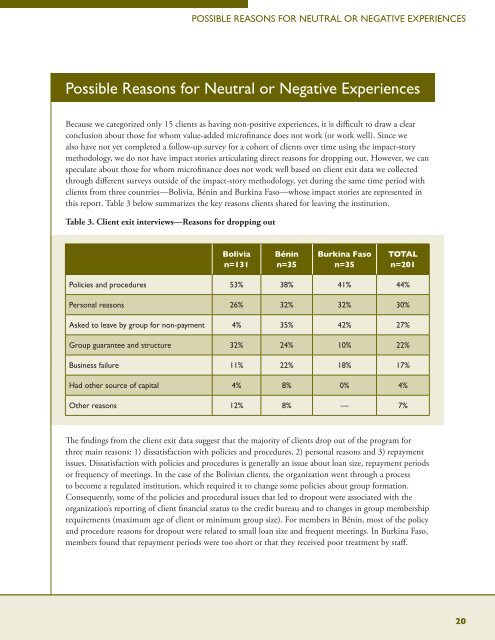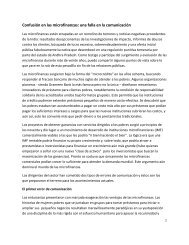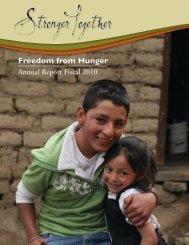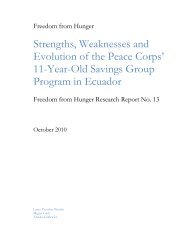English - Freedom from Hunger
English - Freedom from Hunger
English - Freedom from Hunger
You also want an ePaper? Increase the reach of your titles
YUMPU automatically turns print PDFs into web optimized ePapers that Google loves.
Possible Reasons for neutral or negative experiences<br />
Because we categorized only 15 clients as having non-positive experiences, it is difficult to draw a clear<br />
conclusion about those for whom value-added microfinance does not work (or work well). Since we<br />
also have not yet completed a follow-up survey for a cohort of clients over time using the impact-story<br />
methodology, we do not have impact stories articulating direct reasons for dropping out. However, we can<br />
speculate about those for whom microfinance does not work well based on client exit data we collected<br />
through different surveys outside of the impact-story methodology, yet during the same time period with<br />
clients <strong>from</strong> three countries—Bolivia, Bénin and Burkina Faso—whose impact stories are represented in<br />
this report. Table 3 below summarizes the key reasons clients shared for leaving the institution.<br />
Table 3. Client exit interviews—Reasons for dropping out<br />
PossIble Reasons FoR neuTRal oR negaTIve exPeRIenCes<br />
Bolivia<br />
n=131<br />
Bénin<br />
n=35<br />
Burkina Faso<br />
n=35<br />
TOTAL<br />
n=201<br />
Policies and procedures 53% 38% 41% 44%<br />
Personal reasons 26% 32% 32% 30%<br />
asked to leave by group for non-payment 4% 35% 42% 27%<br />
group guarantee and structure 32% 24% 10% 22%<br />
business failure 11% 22% 18% 17%<br />
Had other source of capital 4% 8% 0% 4%<br />
other reasons 12% 8% — 7%<br />
The findings <strong>from</strong> the client exit data suggest that the majority of clients drop out of the program for<br />
three main reasons: 1) dissatisfaction with policies and procedures, 2) personal reasons and 3) repayment<br />
issues. Dissatisfaction with policies and procedures is generally an issue about loan size, repayment periods<br />
or frequency of meetings. In the case of the Bolivian clients, the organization went through a process<br />
to become a regulated institution, which required it to change some policies about group formation.<br />
Consequently, some of the policies and procedural issues that led to dropout were associated with the<br />
organization’s reporting of client financial status to the credit bureau and to changes in group membership<br />
requirements (maximum age of client or minimum group size). For members in Bénin, most of the policy<br />
and procedure reasons for dropout were related to small loan size and frequent meetings. In Burkina Faso,<br />
members found that repayment periods were too short or that they received poor treatment by staff.<br />
20















